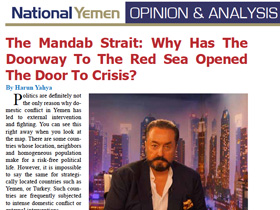
Politics are definitely not the only reason why domestic conflict in Yemen has led to external intervention and fighting. You can see this right away when you look at the map. There are some countries whose location, neighbors and homogeneous population make for a risk-free political life. However, it is impossible to say the same for strategically located countries such as Yemen, or Turkey. Such countries are frequently subjected to intense domestic conflict or external interventions.
Because of its position at the top of the Red Sea, Yemen has attracted the interest of the Western world ever since the twilight of the Ottoman Empire. The Bab-el-Mandeb (better known as the Mandab Strait) at the southern tip of the Red Sea is an important gateway to global trade routes and that makes Yemen, on its eastern shore, strategically important, too.
The Mandab Strait is an important exit point for the world's oil trade. The distance across is about 32 kilometers and the strait links the Red Sea to the Indian Ocean and means that tens of thousands of commercial ships are able to cross from Asia to Africa every year. Another factor that makes the Mandab Strait important is its proximity to the Gulf of Basra. This strait, which joins the Red Sea and the Indian Ocean, reduces the distance involved by three-quarters, eliminating the need to go around the Cape of Good Hope. In other words, it would cost four or five times more for an oil tanker leaving the Persian Gulf to reach a Mediterranean country without entering the Red Sea. Bearing in mind the transit time of the journey that would otherwise be involved, it is easy to see what makes the Mandab Strait so attractive.
An average of 33,000 commercial ships pass through the Mandab Strait every year. The volume of trade passing through the strait is an annual $1.8 trillion. The value of the oil that passes through in one year is more than $315 billion. Twenty-six percent of the world’s oil exports passes through it.
This all means that Yemen is certainly in the eye of the world’s powers. The opening of the Suez Canal in the 19th century considerably increased Yemen’s importance. As the oil trade grew, the Mandab Strait permitted the transportation of energy, far more so than of goods and passengers. Companies from countries including Egypt, Saudi Arabia, the UAE and Qatar as well as Western countries all make money from the region.
Under international law, countries are obliged to keep such straits open and permit passage through them. However, that rule may be interrupted in a time of war. It is obvious how even a brief closure of a route with such dense traffic as the Gulf of Aden would raise costs enormously. Strategists therefore refer to the Mandab Strait and other such straits as “chokepoints.”
The influence of Iran in the Strait of Hormuz, the first gateway for oil from the Gulf, is very well known. The security of the next gateway, the Mandab Strait, is also of vital importance to many countries. Indeed, reports that Houthi militants in Yemen had seized control of a base on the Mandab Strait joining the Red Sea to the Gulf of Aden was a turning point of the war in Yemen becoming an international problem.
In the same way that people may covet others’ property for their own personal gain, that same selfish attitude can also be seen in international relations. This state of affairs, known as “power politics,” is based on the idea that countries’ relations are almost entirely dominated by conflicts of interest. Countries that equate defeat in conflict with complete annihilation regard it as legitimate to weaken, exploit and even destroy other countries for the sake of their own power.
This concept of foreign policy, also known as “realism” in international politics, and pioneered by former consultant to the U.S. Department of State Hans J. Morgenthau, was adopted by many Western countries. It may be surprising, but countries that say they are governed by Islamic laws can also subscribe to that way of thinking.
There are no permanent friendships for these countries, only sporadic episodes of solidarity based on self-interest. It is impossible for such relations, as they are dominated by the philosophy of perpetual conflict, to bring about world peace because countries will always feel themselves to be under threat. Relations of this kind lead to the spread of war and to economic and political crises. Innocent men, women and children suffer and die for the sake of the interests of powerful states.
The reason behind a conflict-based approach to international relations is that countries’ leaders, be they democratic, theocratic or socialist or whatnot, have no fear of God and look at the world in purely materialistic terms. It is all too easy for a ruler who never imagines that upon his death he will be held to account for the death of a child in Yemen to give the order for a village to be bombed.
Therefore, if Muslims adopt a way of living that heeds God’s prohibition and advice, this will also strengthen the bonds of love and solidarity between them. A sense of unity from Morocco to Indonesia will save the lives of countless children, not only in Yemen, but also in Iraq, Rakhine and Afghanistan.
Adnan Oktar's piece on National Yemen


